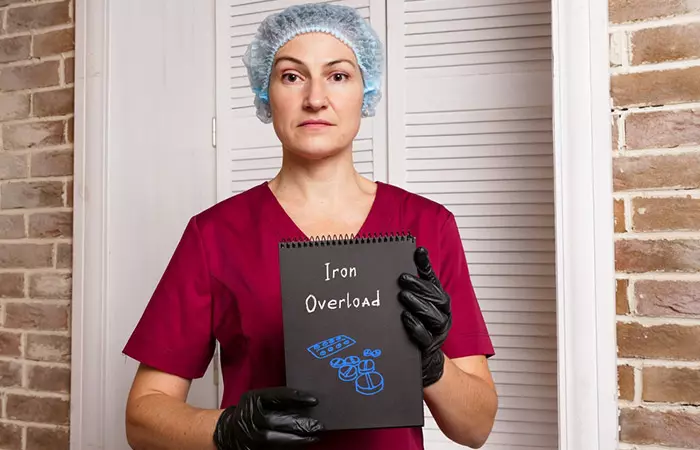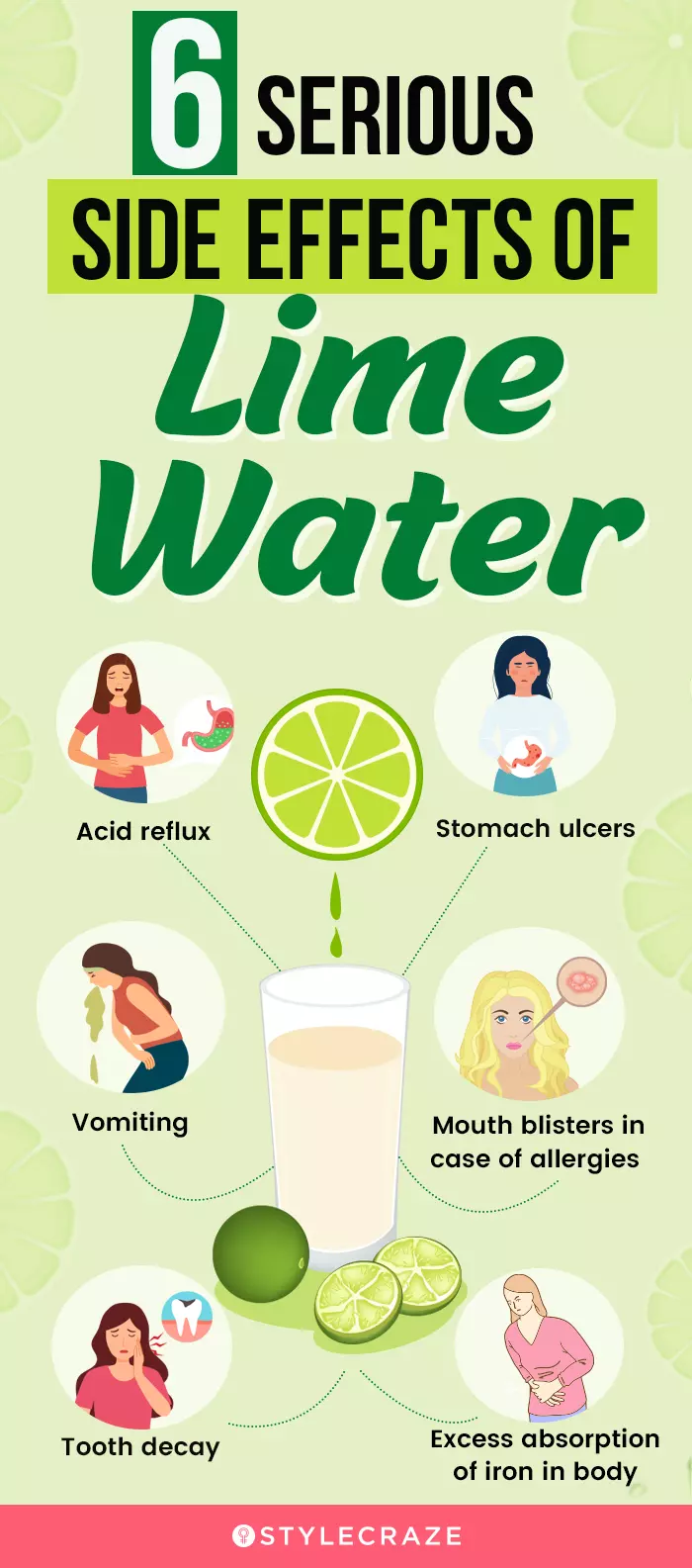Although lime juice is one of the best natural and refreshing juices to drink, especially during the hot summer months, it has several side effects that you need to be aware of. This article highlights the side effects of lime juice, its safety, and any potential drug interactions. Read on to learn more.
In This Article
Side Effects Of Lime Juice
Get to know about the serious sweet lime juice side effects here:
1. GERD
What?
GERD, also known as ‘gastroesophageal reflux disorder’, is a digestive disorder that affects the ring of muscle between the esophagus and stomach.
How?
GERD is triggered by spicy or acidic foods like lemon juice. Lemon juice can actually irritate the esophageal lining thereby exacerbating GERD (1).
Symptoms?
The symptoms of GERD include nausea, heartburn and vomiting.
Related: Top Acidic Foods That You MUST Avoid + Healthy Substitutes Trivia German surgeon Heinrich Quincke first described esophagitis (also called GERD) in 1879.
2. Tooth Decay

Image: Shutterstock
What?
Natural bacteria flourish in our mouths and form plaque. When we don’t frequently wash our mouth, or we ignore to washing our mouth after drinking or eating something, plaque accumulates and creates cavities in our teeth. Even consumption of something that can be harmful to the enamel can cause tooth decay.
How?
We know lime juice has a high citric acid content. Its high acidity can lead to the decay of the tooth enamel. If this decay progresses into the dentini XA thick, yellow, calcified material or tissue that forms the bulk of a tooth and falls below the enamel. , you might start experiencing sensitivity and pain.
Symptoms?
Other consequences of consuming lime juice (especially canned) in excessive quantities include loss of dental tissue, stained teeth and in some extreme cases, cavities (2).
StyleCraze Says Excess consumption of lime juice may affect the soft tissues inside your mouth. It may worsen canker sores.
3. Stomach Ulcers

Image: Shutterstock
What?
Stomach ulcers, also known as peptic ulcers are extremely painful sores that are found in the stomach lining or small intestine. Stomach ulcers happen when the thick mucus lining inside the stomach gets thinned.
How?
The citric acid in lime can aggravate and worsen the ulcers within the stomach. The increased acid (citric acid + acid produced in your stomach) can irritate the stomach lining and stop the ulcers from healing properly (3).
Symptoms?
Symptoms of stomach ulcers include terrible pain within the stomach, bloating, vomiting, and unexpected weight loss (4).
4. Problems During Pregnancy

Image: Shutterstock
What?
Pregnancy is an important and yet delicate time for any woman. Since excessive consumption of lime juice can affect the stomach, this might directly impact the baby inside the mother’s womb.
Furthermore, the chances of contracting food-borne illnesses increase during pregnancy. Drinking unpasteurized lime juice might be harmful and can even directly affect your baby (5).
How?
Your immune system is considerably weak during pregnancy. Due to this deficiency, you are more prone to heartburn and food-borne illnesses (like salmonellai XCommon bacterial infection affecting the intestinal tract caused due to the intake of contaminated food and water. and E.colii XA type of bacteria that lives in the lower intestine of humans and animals that can cause intestinal infections. ) during the time of your pregnancy (6).
Symptoms?
Consuming too much of lime juice during pregnancy can lead to stomach cramps, indigestion, and diarrhea.
Related: 3 Main Reasons To Avoid Brinjal (Eggplant) During Pregnancy
5. Hemochromatosis

Image: Shutterstock
What?
Hemochromatosis is a disorder which disables the body from absorbing iron. This results in the buildup of iron salts and their deposition on the tissues leading to complications. The vitamin C in lime juice, also called the ascorbic acid, affects the absorption of iron in the body.
How?
Excessive consumption of vitamin C can increase the amount of iron you absorb from your food. But the downside is it also hinders the body from absorbing iron. This results in the accumulation of iron inside the body (7).
Symptoms?
Symptoms include fatigue, weakness, joint pain and heart failure (8). This is a serious side effect of lime juice as it can lead to death at times.
6. Sulfite Disorders
What?
Sulfites are nothing but a group of sulfur-based compounds, which both occur naturally as well as are added to food products as preservatives. Lime juice contains sulfites, which might trigger complications in people with sensitive systems (9).
How?
Sulfites (the ones used as preservatives) are inorganic salts that can help extend the shelf life of foods. These salts can prevent the food from turning brown, and also hinder the growth of bacteria (10). Lime juice contains sulfites which can cause reactions and allergies in some people.
Symptoms?
Itchy skin, hives, rashes, stomach cramps, nausea, cough, etc. (11).
7. Might Affect Kidneys

Image: Shutterstock
What?
Though lime juice helps treat kidney stones and is good for healthy kidneys, people suffering from kidney ailments should not consume lime juice as it might cause renali XA term used in reference to kidney failure or when the kidney stops working due to diabetes or hypertension. damage.
How?
Citrus fruits generally contain high potassium levels. This might be bad for those suffering from kidney disease. The diseased kidneys wouldn’t be able to maintain the electrolytei XElectrically charged minerals in your blood and other bodily fluids that play a key role in balancing the body’s water and pH levels. balance. This leads to abnormal levels of potassium, sodium and phosphorus (12).
Symptoms?
The symptoms include abnormal heart rhythm, weakness and slow heart rate.
Related: 16 Home Remedies For Kidney Stone Pain And Prevention Tips
Infographic: 6 Serious Side effects Of Lime Water
Drinking lime juice is refreshing but sometimes it can cause some unexpected side effects without even knowing them. While all the side effects are covered in this article, there are some serious side effects which need your immediate attention. Check out the infographic given below to know them.

Illustration: StyleCraze Design Team
Save the high-quality PDF version on your device now.
Download Infographic
Antioxidants abound in lime juice, making it a refreshing drink to rehydrate when you’re tired. However, overconsumption can lead to a number of problems. The side effects of lime juice range from an increased risk of developing digestive disorders like GERD to dental problems. It also puts you at high risk for stomach ulcers or kidney disorders. It may interfere with the absorption of iron leading to hemochromatosis. While pregnant, excessive lime juice consumption may cause health problems. Avoid such complications by limiting your intake or abstaining from it altogether.
Frequently Asked Questions
Is it OK to drink straight lime juice?
Jesse Feder, Clinical Dietitian, says, “It is generally safe to drink lime juice straight. However, it can be high in sugar and cause spikes in your blood glucose levels. It is also acidic, which can harm the enamel of your teeth, as well as potentially irritate your stomach.”
Can lime cause yeast infections?
According to Jesse, “Anecdotally, drinking lime juice has been shown to help prevent yeast infections. However, there is limited scientific backing for this. Additionally, directly applying lime juice to the pubic area may cause a yeast infection due to the sugar content.”
Does lime lower blood pressure?
Jesse Feder says, “Limes are a great source of potassium and magnesium, which can help lower your blood pressure levels.”
Is it OK to drink lime water every day?
Yes. Lime juice is packed with vitamin C and antioxidants that help support good health.
How much lime juice should I drink per day?
Eva De Angelis, Dietitian Nutritionist, says, “To be safe and avoid any of the aforementioned side effects, limit yourself to drinking no more than the juice of three limes per day.”
Which is healthier: lemon or lime juice?
Lemon juice. Vitamin C is slightly higher in lemons compared to limes. Lemons are also richer in potassium, folate, and vitamin B6 (13), (14).
Was this article helpful?
“>
Related
The following two tabs change content below.
- Reviewer
- Author
- Expert

Janelle Bigelman, MS, RDN


Janelle Bigelman is a registered dietitian with 3 years of experience. Being an athlete and heavily invested in sports while growing up, she quickly learned the interconnection of optimal nutrition and how one’s daily dietary habits can impact one’s overall health, longevity recovery and performance, both positively and negatively. This led her to open her own private nutrition consulting business…View Profile ›
Tanya Choudhary, Health & Wellness Writer
Tanya is an ISSA certified Specialist in Fitness & Nutrition. She specializes in writing articles on ingredients that benefit skin, hair, and health. She believes in the right health and lifestyle practices and strives to promote the same to everyone around her. She finds purpose in creating authentic and useful content that can impact people’s health in better ways. In…View Profile ›

Eva De Angelis, RDN
 Eva De Angelis is a Dietitian Nutrionist from Argentina. She specializes in food and nutrition education, and healthy cooking.
Eva De Angelis is a Dietitian Nutrionist from Argentina. She specializes in food and nutrition education, and healthy cooking.
She has a Bachelor’s degree in Human Nutrition and Dietetics from ISalud University, a postgraduate certificate in Nutrition, Gastronomy, and Health, a culinary diploma, and an intermediate-level technical degree in Food Science.
Eva De Angelis is a Dietitian Nutrionist from Argentina. She specializes in food and nutrition education, and healthy cooking.
She has a Bachelor’s degree in Human Nutrition and Dietetics from ISalud University, a postgraduate certificate in Nutrition, Gastronomy, and Health, a culinary diploma, and an intermediate-level technical degree in Food Science.-
Jesse Feder, RDN/LDN
 Jesse Feder, RDN/LDN, is a Clinical Dietitian at the Memorial Regional Hospital. He is also a certified by the American College of Sports Medicine as a personal trainer (ACSM-CPT) and the National Strength and Conditioning Association as a Certified Strength and Conditioning Specialist (NSCA-CSCS).
Jesse Feder, RDN/LDN, is a Clinical Dietitian at the Memorial Regional Hospital. He is also a certified by the American College of Sports Medicine as a personal trainer (ACSM-CPT) and the National Strength and Conditioning Association as a Certified Strength and Conditioning Specialist (NSCA-CSCS).
Jesse Feder, RDN/LDN, is a Clinical Dietitian at the Memorial Regional Hospital. He is also a certified by the American College of Sports Medicine as a personal trainer (ACSM-CPT) and the National Strength and Conditioning Association as a Certified Strength and Conditioning Specialist (NSCA-CSCS).
